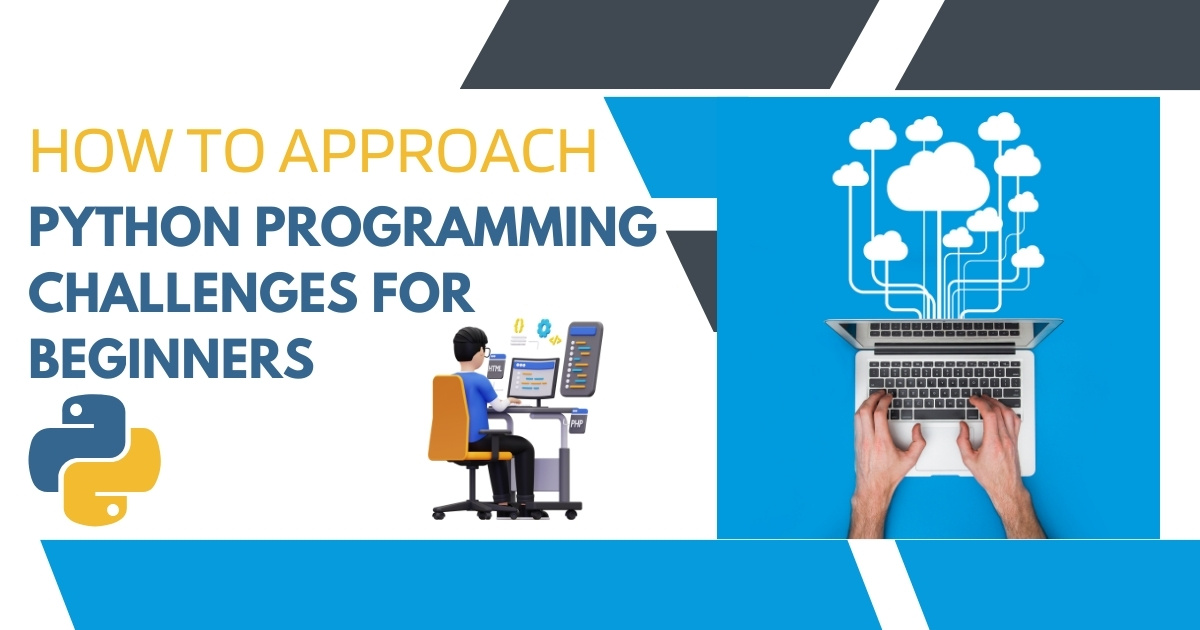Python programming challenges are a fun and useful way for newbies to improve their Python skills. Programmers can boost their confidence, get better at solving problems, and learn how to use what they’ve learned in the classroom in real life by taking on these Python programming challenges. We’ll explore how beginners might successfully tackle Python programming challenges in this blog post, providing tips to help you along the way.
What are Python programming challenges, and why are they important?
Python programming challenges are a wide range of difficulties or puzzles that must be solved using Python. These challenges, ranging from coding challenges to algorithmic puzzles and project-based tasks, serve several fundamental functions:
Skill Development: Completing challenges is a great way to improve important Python computing skills like syntax, data structures, and putting algorithms into action.
Problem-Solving Skills: Facing challenges is crucial for developing problem-solving abilities, and pushing programmers to think critically and creatively to come up with solutions.
Real-life Use: Challenges frequently resemble real-world situations, allowing programmers to use their skills in real-world situations. For those new to the field looking to create a portfolio or get ready for technical interviews, this can be very beneficial.
How can beginners find Python programming challenges?
For those new to Python programming, there are multiple online platforms and websites specifically designed for coding challenges. LeetCode, HackerRank, etc., provide a wide range of challenges that cater to programmers of varying skill levels. Moreover, coding communities and forums often organize programming challenges and competitions, offering beginners plenty of chances to interact with the programming community and improve their skills.
What are the basic concepts and skills needed to tackle Python programming challenges?
Mastering Python programming challenges necessitates a strong understanding of core programming principles and abilities, such as:
- Variables and Data Types: Knowing how to declare variables and work with various data types such as integers, strings, and lists is crucial.
- Control Structures: Mastering control structures like loops and conditional statements is essential for managing program flow effectively.
- Functions: It’s essential to be well-versed in defining and implementing functions to streamline code and effectively address issues.
- Problem-Solving: Mastering problem-solving skills requires breaking down intricate problems into smaller parts, carefully analyzing the issue, identifying the necessary steps for resolution, and then converting these steps into code.
What are some tips for solving Python programming challenges effectively?
A deliberate strategy is required to effectively solve problems in Python programming challenges. Here are some tips to help beginners handle challenges more efficiently:
- Understand the Problem: Before beginning to code, make sure you have a clear understanding of the requirements by carefully reading the problem description.
- Break It Down: Divide the problem into smaller, more manageable pieces. Before merging the pieces into a comprehensive solution, solve each component separately.
- Use Pseudocode: Before writing any actual code, write some pseudocode outlining your strategy. This can expedite the coding process and help you organize your ideas.
- Test Your Code: As you write your code, make sure to test it often. By doing this, you can make sure that your code is working as it should and identify bugs early on.
- Use Built-in Functions and Libraries: Utilize the built-in libraries and functions in Python to streamline and expedite your work.
- Seek Help When Stuck: If you run into difficulties, don’t be afraid to ask for assistance from colleagues, internet resources, or discussion boards. Working together and taking advice from others can be very beneficial.
How can beginners avoid common pitfalls when solving Python programming challenges?
Beginners may run across frequent problems when attempting to solve Python programming challenges. Here are some suggestions for avoiding them:
- Not Reading the Problem Carefully: Make sure you comprehend the requirements by carefully reading the problem statement.
- Ignoring Edge Cases: To make sure your solution functions appropriately in all scenarios, take edge cases and boundary conditions into consideration.
- Not Testing Enough: Make sure your code generates the right output in every scenario by testing it with various inputs.
- Overly Complicated Solutions: Make an effort to provide clear, concise answers. Attempts to overcomplicate might result in mistakes and inefficiency.
- Not Seeking Help: Don’t hesitate to seek help from online resources, forums, or peers if you’re struggling with a problem. Collaboration can lead to better solutions.
Don’t Miss Node.js Vs. Java: Choosing The Right Technology
What are the benefits of solving Python programming challenges for beginners?
Solving Python programming challenges offers several benefits for beginners:
- Skill Enhancement: Improving skills involves facing challenges that enhance Python programming abilities, such as problem-solving, algorithm design, and coding efficiency.
- Building a portfolio: By completing challenges, beginners can create a collection of projects showcasing their skills and knowledge to potential employers.
- Preparation for Interviews: Getting ready for interviews involves tackling coding challenges, which can be beneficial for beginners gearing up for technical interviews.
- Community Engagement: Engaging in challenges enables newcomers to interact with the programming community, ask for help, and gain knowledge from others.

How can beginners improve their Python skills after completing basic programming challenges?
After completing basic programming challenges, beginners can continue to improve their Python skills by:
- Taking on More Challenges: Embracing more challenges by gradually increasing the difficulty level to further enhance skills.
- Working on Projects: Engaging in projects that catch their attention and utilizing their Python skills in practical situations.
- Learning Advanced Concepts: Studying advanced Python concepts, such as object-oriented programming, data structures, and algorithms.
- Participating in Coding Competitions: Engaging in coding competitions to test their skills against other programmers and gain valuable experience.
What are the best practices for approaching Python programming challenges?
For beginners to effectively tackle Python programming challenges, it’s important to adhere to these best practices:
- Understand the Requirements: Make sure to carefully read and understand the problem statement before beginning to code.
- Plan Your Approach: Develop a plan or algorithm to address the issue prior to coding. If needed, utilize pseudocode.
- Break the Problem Down: Divide the problem into smaller, more manageable parts and solve each part individually.
- Write Clean and Readable Code: Write Clean and Readable Code: Use descriptive variable names and comments to make your code easier to understand.
- Test your Code: Make sure to test your code with various inputs to verify that it generates accurate output for all scenarios.
- Optimize Your Solution: Look for ways to optimize your code for efficiency, but prioritize readability and correctness.
Conclusion
Ultimately, Python programming challenges serve as a valuable resource for beginners looking to improve their Python programming abilities. When beginners solve challenges strategically, they can enhance their problem-solving skills, build confidence, and get ready for real-world programming situations. By adhering to the advice and recommended strategies provided in this blog post, those who are new can better handle Python programming obstacles and advance their skills in the field.
FAQs
- Are Python programming challenges suitable for absolute beginners with no prior programming experience?
- While Python programming challenges can be beneficial for beginners, those with no prior programming experience may find them challenging. It’s recommended for absolute beginners to first learn the basics of Python programming before attempting challenges.
- How can I track my progress in solving Python programming challenges?
- To track your progress, you can maintain a log or spreadsheet where you record the challenges you’ve attempted, the solutions you’ve implemented, and any lessons learned from each challenge. This can help you identify areas for improvement and track your growth over time.
- Are there specific Python libraries or modules that are commonly used in programming challenges?
- Yes, there are several Python libraries and modules that are commonly used in programming challenges, such as
collections,itertools, andmath. These libraries provide useful functions and data structures that can help simplify the coding process for certain challenges.
- Yes, there are several Python libraries and modules that are commonly used in programming challenges, such as
- How can I stay motivated while solving Python programming challenges?
- Staying motivated can be challenging, especially when faced with difficult or frustrating challenges. To stay motivated, set small, achievable goals, take breaks when needed, and celebrate your accomplishments, no matter how small. Additionally, joining a community of like-minded programmers can provide support and encouragement.
- Are there any online communities or forums where I can discuss Python programming challenges with others?
- Yes, there are several online communities and forums where you can discuss Python programming challenges with others, such as Reddit’s r/learnpython, Stack Overflow, and the Python Discord server. These communities can be valuable resources for getting help, sharing ideas, and connecting with other programmers.
